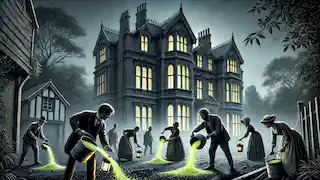In the small, sleepy town of Jefferson, Miss Emily Grierson’s funeral stirred the entire community. Her death marked the end of an era, a passing of old Southern aristocracy. Miss Emily had been a reclusive figure, living alone in a once-grand house that had fallen into disrepair. She had become something of a local legend, a relic of the past that no one fully understood but everyone spoke about in hushed whispers.
The townspeople came to her funeral out of respect, curiosity, and a desire to witness the final chapter of her mysterious life. Her house, a decaying mansion that had once stood proudly on one of the town’s most prominent streets, now seemed out of place among the encroaching modern buildings and new developments. The air of mystery surrounding Miss Emily was palpable, and it clung to her even in death, just as it had throughout her life. Miss Emily came from a prestigious family, the Griersons, who were once considered the elite of Jefferson. Her father had been a proud, imposing man who ruled over both Emily and the family estate with an iron fist. He had driven away any potential suitors, believing that none were good enough for his daughter. As a result, Emily grew up isolated, her world limited to the boundaries of her family home and the oppressive presence of her father. After her father's death, Emily was left alone in the crumbling mansion, with no family to speak of and no prospect of marriage. She became an enigma to the townspeople, a woman frozen in time, bound by the traditions and expectations of a bygone era. The town watched her with a mix of fascination and pity, unsure of what to make of the reclusive woman who rarely left her house. For years, she was seen only occasionally, a solitary figure moving through the dusty rooms of her once-grand home. Her isolation only deepened the mystery surrounding her, and the townspeople could only speculate about her life inside the decaying walls. The turning point in Miss Emily's life came with the arrival of Homer Barron, a construction foreman from the North. Homer was in town overseeing a road-paving project, and his loud, boisterous personality contrasted sharply with the quiet, reserved nature of Jefferson’s residents. He was a man who enjoyed life, known for his jovial demeanor and his ability to charm those around him. Despite their differences, Miss Emily and Homer were soon seen together around town. The sight of them riding in his yellow-wheeled buggy was a source of gossip and speculation for the townspeople. Some were scandalized by the relationship, as Homer was considered beneath Emily’s social status, and others were simply shocked that she had allowed someone into her life at all. As the relationship progressed, people began to wonder if Miss Emily might finally marry. For years, she had been the town’s most eligible yet elusive bachelorette. Now, with Homer by her side, it seemed possible that she might break free from the oppressive legacy of her family and begin a new chapter in her life. But as time passed, it became clear that Homer had no intention of marrying. He was a man who enjoyed his freedom and was not inclined toward settling down, especially not in the quiet town of Jefferson. Rumors began to circulate that Homer was planning to leave, and as the gossip grew louder, Miss Emily’s behavior became more erratic. One day, she went to the local pharmacy and bought arsenic. When the pharmacist asked her what she intended to do with the poison, she simply replied, "For rats." The townspeople suspected that Homer Barron was the "rat" she intended to deal with, but no one dared to confront her directly. After Miss Emily purchased the poison, Homer Barron disappeared. No one saw him again, and the townspeople began to speculate that something terrible had happened to him. Some believed that he had abandoned Miss Emily and left town, while others whispered that she had killed him. The truth, however, remained hidden behind the doors of Miss Emily's house. For years, Miss Emily continued to live in her decaying mansion, never leaving and allowing no one to enter. The only sign of life was her servant, Tobe, who came and went, tending to her needs but never speaking of what went on inside the house. The town’s interest in Miss Emily waned as the years passed. New generations grew up, and the memory of Homer Barron faded into the background. But Miss Emily remained a fixture of the town, a living reminder of the past that refused to let go. Her house, once a symbol of wealth and prestige, now stood as a decaying monument to a time long gone. At one point, a strange odor began to emanate from Miss Emily’s house. It was an acrid, foul smell that disturbed the neighbors. Several of the townspeople complained, but no one dared to confront Miss Emily directly. Instead, the town officials took matters into their own hands. Under the cover of darkness, they scattered lime around the house, hoping to neutralize the smell. It worked, and the odor eventually faded, but the mystery of its origin remained. The townspeople speculated about what could have caused it, but no one ever knew for sure. Miss Emily's house continued to stand, silent and impenetrable, guarding its secrets. The once-vibrant woman who had briefly been the center of town gossip had retreated entirely from public view, becoming little more than a ghost haunting the decaying halls of her home. In her later years, Miss Emily became even more reclusive. She stopped appearing in public altogether, and the only person who ever saw her was Tobe. The town continued to whisper about her, but as the years passed, she became more of a curiosity than a real figure in the community. When Tobe finally died, Miss Emily was left completely alone. The townspeople rarely thought of her anymore, except as a relic of the town's history. They knew little about her day-to-day life, and by the time of her death, she had become more of a legend than a living person. When Miss Emily died, the town was shocked. The townspeople flocked to her funeral, eager to catch a glimpse of the inside of her house and to finally learn the secrets that had been hidden for so long. After Miss Emily's burial, the townspeople, eager to satisfy their curiosity, entered her home. They were greeted by dust and decay, a house frozen in time. But it was the discovery in a locked upstairs room that shocked them the most. There, on a bed, they found the decomposed body of Homer Barron. He had been dead for years, lying in a room that had been sealed off from the world. Next to the body, they found a long strand of Miss Emily’s gray hair on the pillow, suggesting that she had been lying beside him long after his death. The revelation was chilling. Miss Emily had poisoned Homer Barron to keep him with her forever. Her desperate need for love and companionship had driven her to an unspeakable act, one that had remained hidden for decades. The town finally understood the full extent of Miss Emily's madness, and her legacy was forever marked by this grim discovery. Miss Emily’s death marked the end of the Grierson legacy and the passing of an era. Her house, once a symbol of wealth and status, was now a decaying ruin, much like the old South itself. The townspeople reflected on her life with a mixture of pity and horror, recognizing that she had been a victim of her circumstances, trapped by her father’s overbearing influence and the rigid expectations of her society. In death, as in life, Miss Emily remained an enigma. The mystery of her existence, the strange relationship with Homer Barron, and the grisly discovery in the upstairs room only deepened the town’s fascination with her. She had lived her life on her own terms, even if those terms were rooted in tragedy and madness. Miss Emily Grierson, the last of her line, had finally found peace, but the town of Jefferson would never forget her.The Grierson Legacy

The Arrival of Homer Barron
A Town in Suspense

The Odor
Emily's Final Years
The Discovery

Epilogue: The End of an Era



















